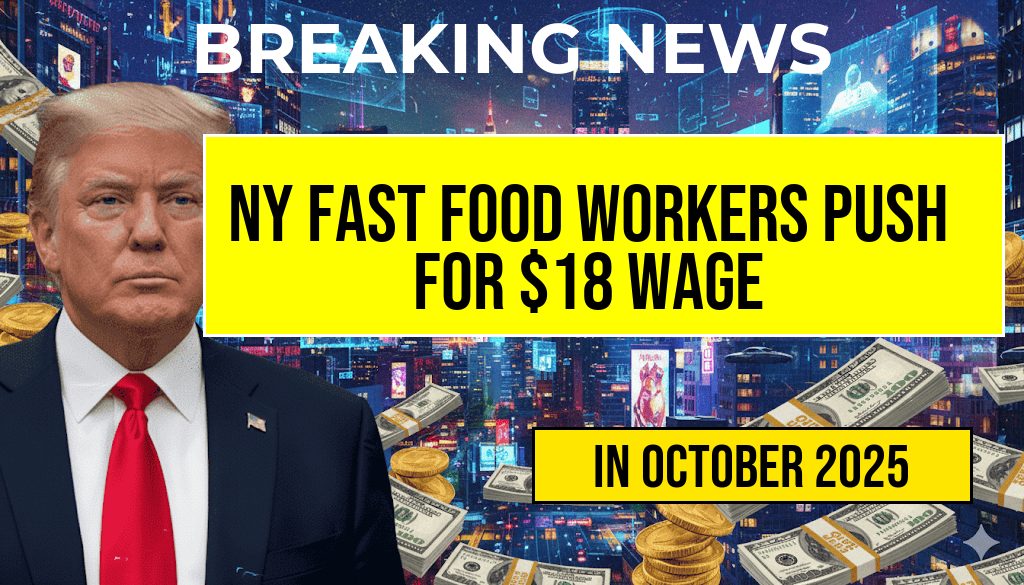Fast food workers in New York are rallying for a wage increase to $18 per hour, ignited by the passage of a new law aimed at enhancing labor conditions in the fast food industry. This push comes as part of a broader movement to address wage disparities and improve the livelihoods of low-wage workers across the state. Advocates argue that the current minimum wage, which stands at $15 an hour, is insufficient to meet the rising cost of living in metropolitan areas. The new law, implemented by New York’s Department of Labor, is expected to provide a framework for evaluating wage increases, with a particular focus on the fast food sector, which employs thousands of individuals who often struggle to make ends meet.
Background of the Wage Increase Movement
The fast food industry has long been a focal point of labor rights discussions, particularly regarding fair wages. With inflation steadily rising and the cost of housing, food, and transportation increasing, many workers find themselves unable to support their families comfortably. Organizations such as SEIU (Service Employees International Union) have been instrumental in advocating for better pay and working conditions, leading the charge for the $18 per hour wage. Recent protests and organized strikes have garnered significant media attention, highlighting the plight of workers who often juggle multiple jobs to survive.
Details of the New Law
The new legislation, signed by Governor Kathy Hochul, outlines specific criteria for evaluating wage adjustments in the fast food sector. It mandates annual assessments to determine whether wage increases are warranted based on economic conditions, company profits, and employee productivity. The law aims to create a more equitable pay structure that reflects both the cost of living in New York and the financial realities of the industry.
Key Provisions of the Law
- Annual Wage Assessments: The Department of Labor will review economic conditions yearly to justify wage increases.
- Employee Protections: Workers will have increased protections from retaliation when advocating for higher wages.
- Transparency Requirements: Fast food companies must disclose their profit margins, which will be factored into wage considerations.
Support from Local Communities and Organizations
Community support for the wage increase has been strong, with local advocacy groups organizing events to raise awareness about the issue. Many New Yorkers recognize that fair wages contribute to a healthier economy, as workers with more disposable income can spend more in their communities. Local businesses, labor unions, and even some politicians have expressed their backing for the initiative, emphasizing the need for a living wage that allows workers to provide for themselves and their families.
Impact on Workers and the Economy
Raising the minimum wage for fast food workers is expected to have a significant impact on both employees and the economy at large. A higher wage can lead to increased job satisfaction, reduced turnover rates, and improved productivity in the workplace. Furthermore, as workers earn more, they are likely to spend additional income on local goods and services, thus stimulating economic growth. Research has shown that when low-wage workers receive pay increases, the overall economy benefits through increased consumer spending.
Challenges Ahead
Despite the overwhelming support for the wage increase, challenges remain. Fast food companies argue that raising wages could lead to higher menu prices and potential layoffs. Critics of the law caution that while the intention is to support workers, the reality of implementation may lead to unintended consequences that could harm both employees and businesses. As the law progresses, stakeholders will need to engage in ongoing dialogue to address these concerns and ensure the successful implementation of the new wage structure.
Next Steps for Advocacy Groups
As the law takes effect, advocacy groups plan to continue their efforts to monitor its impact and push for further improvements in labor conditions. They aim to ensure that the wage increase is not only implemented but also sustained over time, advocating for periodic reviews to keep pace with economic changes. The movement for fair wages in New York is part of a larger national trend, as similar initiatives are being pursued across the country, reflecting a growing recognition of the importance of fair compensation for essential workers.
For more information on the fast food wage movement, visit Forbes and Wikipedia.
Frequently Asked Questions
What is the proposed wage increase for fast food workers in New York?
The proposed wage increase for fast food workers in New York is to $18/hour under a new law aimed at improving their compensation.
Who is advocating for the $18/hour wage?
The advocacy for the $18/hour wage is led by fast food workers, labor unions, and various worker rights organizations seeking better pay and working conditions.
What are the main reasons for the wage increase advocacy?
The main reasons for advocating the wage increase include rising living costs, the need for fair compensation, and the challenges faced by fast food workers in affording basic necessities.
How has the public responded to the wage increase proposal?
The public response to the wage increase proposal has been mixed, with many supporting the fast food workers while others express concerns about potential impacts on businesses and prices.
What impact could the new law have on the fast food industry?
If the new law is enacted, it could lead to significant changes in the fast food industry, including higher wages for workers, potential price increases for consumers, and changes in hiring practices.

Leave a Reply